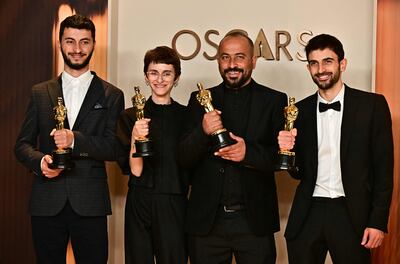Live updates: Follow the latest on Israel-Gaza
Witnesses to Monday’s attack on Hamdan Ballal, the Palestinian co-director with Basel Adra of Oscar-winning documentary No Other Land, told The National about the moment more than a dozen masked Israeli settlers, some armed, descended on the filmmaker's home village of Susiya in the occupied West Bank.
The assault ended with Ballal's arrest along with two other Palestinians by Israeli forces. He was being given medical treatment in an ambulance when he was detained, the witnesses said.
The two others detained were also injured, and all three were held at the Kiryat Arba police station, their lawyers told the Centre for Jewish Nonviolence (CJNV), an activist group whose members tried to assist Ballal. The trio were released on Tuesday evening, with Ballal showing bruises on his face and blood on his clothes, according to AP reporters who witnessed the men leave Kiryat Arba police station.
Ballal's lawyer, Lea Tsemel, said he had spent the night on the floor at a military base while suffering from serious injuries sustained in the attack.
All of them had "received consultation from the lawyer and are now being interrogated. They are suspected of throwing stones and injuring a young settler shepherd," the lawyers said in a text message shared by the group.
Ballal suffered injuries to his head and stomach, according to Israeli filmmaker Yuval Abraham, who co-directed the documentary.
“He was attacked by soldier-settlers and then abducted by soldiers – so we have no idea what happened, we just don’t know,” Basel Adra, another of the film's directors, told The National.
Palestinians in the West Bank use the term soldier-settlers to describe settlers who have been issued arms and military uniforms by the state since the war in Gaza began in October 2023.
Adra and Ballal both live in the Masafer Yatta area, where the attack took place. Their documentary tells of the struggle by its Palestinian residents to stop the Israeli military from demolishing their villages, putting focus on human rights in occupied Palestine, including Israeli military and settler violence against Palestinians.
Adra, who is also a journalist, has reported daily attacks on Palestinians in the area since No Other Land was awarded the Oscar for best documentary on March 2.

Jenna, who gave only her first name, said that she and other American activists dashed to the area after hearing of the attack, which happened as the victims were breaking their Ramadan fasts. Foreign and local activists have an established presence in the area.
“Often when these things happen, by the time we arrive the attack is either over or the settlers are running away,” she said. “This time, we started going up to Hamdan’s house thinking that the people at the top of the hill were soldiers.
"It turned out they were all settlers, one with a rifle. The first one came at us, screaming – they were all masked,” she added.
Dash-cam video from a car belonging the CJNV shows settlers shoving Jenna, and then punching another activist in the stomach and neck. The settlers then started beating the activists with sticks, Jenna said.
When they tried to escape by car, one attacker “threw a giant rock at the front window,” she said. “We were amazed it didn’t break because that could have killed someone.”

In a statement issued early on Tuesday, Israel’s military said a “violent confrontation broke out” after “several terrorists hurled rocks at Israeli citizens, damaging their vehicles near [Susiya]”.
Forces arrived, after which “several terrorists began hurling rocks at the security forces”, the army said.
“In response, the forces apprehended three Palestinians suspected of hurling rocks at them, as well as an Israeli civilian involved in the violent confrontation,” the military added.
“The detainees were taken for further questioning by the Israel police. An Israeli citizen was injured in the incident and was evacuated to receive medical treatment.”
“Contrary to claims, no Palestinian was apprehended from inside an ambulance,” the statement concluded, contradicting the version of events given by witnesses.
Activists accused the military of not intervening to stop the attack. “The army just stood there,” Jenna said. “We told them that the settlers beat us and that [the military] needed to go. They refused. They stood around by their vehicles until all the settlers were able to run away.”
Israel’s military declared Masafer Yatta, a collection of Palestinian hamlets, as a military training zone in the 1980s, a move that paved the way for the expulsion of Palestinian residents.
Many have stayed, but face constant raids by the Israeli military to demolish property. The communities also face violence from nearby settlements, which has greatly increased since the Gaza war began.

